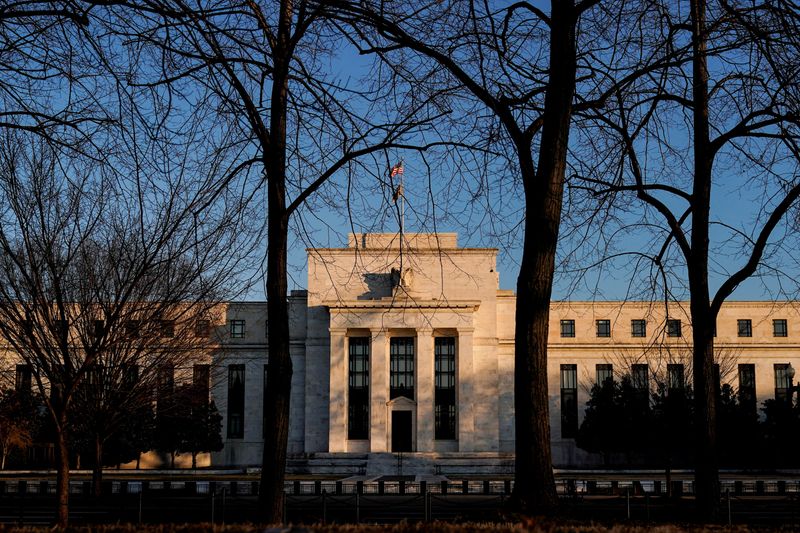
By Ann Saphir
WASHINGTON (Reuters) – Since Donald Trump’s election to a second term last month, Federal Reserve policymakers including Chair Jerome Powell have said it is too soon to factor in the U.S. president-elect’s yet-to-be-detailed policies into forecasts.
But eight years ago Powell as a Fed governor joined the majority of his colleagues in doing just that, meeting records show, bumping up estimates for economic momentum and interest rates to reflect the expected effect of Trump’s tax cuts and other policies.
So it may not be all that surprising that a growth upgrade for next year may be back in the cards again this week when Fed policymakers gather to deliver what is expected to be a third interest rate cut and to update their forecasts for growth, unemployment and inflation.
In September, officials estimated growth at 2% next year. The Philadelphia Fed’s survey of professional forecasters, for one, has since lifted its 2025 estimate to 2.2% from 1.9% previously.
Fed officials are also likely to dial back projections of just how much more they’ll cut interest rates next year. To be sure, they are likely to be reluctant to lay it at Trump’s feet – instead pointing to a run of recent data showing solid momentum into next year that is likely to propel growth, hold down unemployment and keep them on their toes about inflation.
But it may still stand as a preliminary judgment of sorts for what’s to come from Trump as he promises more by way of tax cuts, deregulation and tariffs.
“We are taking Chair Powell and the committee at their word when they say they will make monetary policy based on actual changes to fiscal, trade, and immigration policies and not in advance,” wrote economists at Morgan Stanley (NYSE:MS). Even so, they said, Fed policymaker projections will likely feature stronger growth in 2024, slower disinflation this year and next, “and fewer rate cuts in the appropriate policy path.”
TAKING STOCK
Since the last time they met, in November, several U.S. central bankers have indicated they are open to a more cautious pace of rate cuts, especially with the labor market looking less fragile than it did in September when they started cutting rates, and with inflation more sticky.
Their new best guesses for where the economy and interest rates are headed for the next three years will appear on Wednesday in fresh quarterly projections published at the close of their Dec. 17-18 meeting.
Even without taking the still-uncertain effects of Trump’s plans into account, there is plenty of reason to believe policymakers will see a shallower rate-cut path as appropriate next year, simply because they will be taking stock of the generally stronger economic data since their last projections.
Inflation by the Fed’s targeted metric – the 12-month change in the personal consumption expenditures price index – was 2.3% in October, exactly where policymakers had previously forecast it would be in the final quarter of the year.
But data published so far suggests that core PCE inflation, which Fed policymakers use to gauge underlying price pressures, is on track to end the year around 2.8%, according to several Wall Street analysts who see that inflationary impulse carrying forward into 2025 as well. Fed policymakers in September had projected core PCE inflation at 2.6% in fourth-quarter 2024, and 2.2% in the last quarter of 2025, estimates that look optimistic given recent trends.
The unemployment rate, by contrast, has been running lower than Fed policymakers had forecast. It was 4.1% in October and 4.2% in November. Only a massive deterioration this month could result in a rise in the fourth-quarter average to the 4.4% Fed policymakers had penciled in at September’s meeting, and analysts generally expect the new projections to be a couple tenths of a percentage point lower.
Firmer labor markets and stickier inflation will likely move some policymakers to dial down their rate-cut expectations. Most analysts expect the median projection to be for three quarter-point rate cuts next year, in line with current pricing in financial markets, though a few see a more hawkish two-cut projection as possible.
Policymakers are also expected to write down a further couple of rate cuts in 2026, bringing the policy rate down to 3.4% or 3.1%, versus the 2.9% penciled in as of September.
That 2.9% is equivalent to what policymakers have been nodding to as the ‘longer-run’ or stopping point for the federal funds rate.
Dallas Fed President Lorie Logan has argued that as the Fed’s policy rate approaches its eventual stopping point it should reduce speed, as a ship’s captain maneuvering into harbor must do. Some analysts are looking for the ‘longer-run’ estimate to rise to 3% or potentially higher, further bolstering the case for a go-slower approach.






